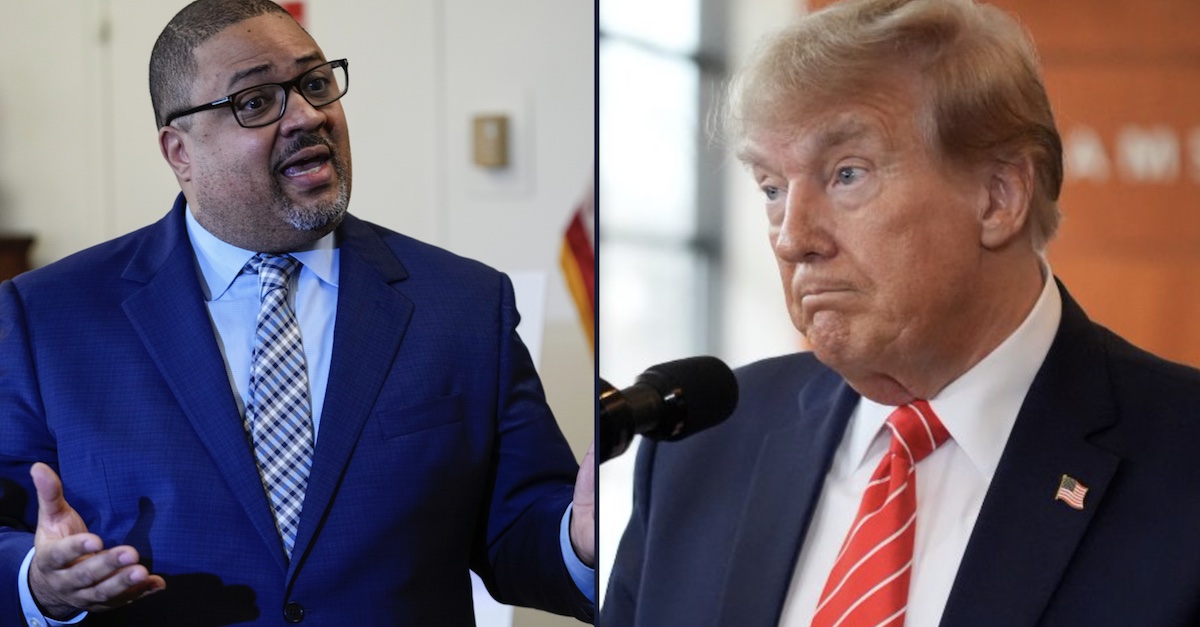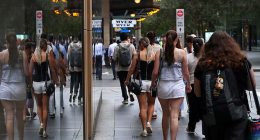
Left: Manhattan District Attorney Alvin Bragg speaks during a news conference on Feb. 22, 2024, in New York (AP Photo/Frank Franklin II). Right: Former President Donald Trump speaks after meeting with the International Brotherhood of Teamsters at their headquarters on Jan. 31, 2024, in Washington (AP Photo/Andrew Harnik).
New York City prosecutors on Thursday morning rubbished a recent series of efforts by Donald Trump to move his hush-money case to federal court as both “untimely” and procedurally off-base.
In a 5-page letter motion, a team of appellate attorneys for the Manhattan District Attorney’s Office implored the U.S. Court of Appeals for the Second Circuit to reject the 45th president’s late Wednesday request to stay a lower court’s earlier rejection.
This week’s flurry of motions practice — back-and-forth; from both the state and the defense — caps several weeks of relative calm as the former president is scheduled to be sentenced for his 34-count felony falsification of business records convictions on Sept. 18.
The recent provenance of Trump’s serially unsuccessful efforts to obtain federal removal and delay sentencing is as follows.
On Aug. 29, the ex-president’s defense team submitted nearly three dozen documents to the U.S. District Court for the Southern District of New York, asking Senior U.S. District Judge Alvin K. Hellerstein to move the case to federal jurisdiction. This was the second such request; a previous effort was denied in July 2023.
On Aug. 30, a docket entry rejected Trump’s removal effort as a “deficient pleading” for various, and enumerated, reasons.
On Sept. 3, Trump’s attorneys Todd Blanche and Emil Bove refiled their second removal notice, attempting to cure the identified deficiencies after conversing with the clerk of court. Later that same day, Hellerstein issued a 4-page order denying leave of court.
On Sept. 4, more or less simultaneously, Trump’s legal team filed with the district and appellate court. The defense asked Hellerstein to stay his order while also asking the court of appeals for an administrative stay pending the appeal of Hellerstein’s order.
Meanwhile, several legal experts on X (formerly Twitter) debated whether Hellerstein’s order should be considered a summary remand back to the state court overseen by New York Supreme Court Justice Juan Merchan — or whether the lower court judge simply disallowed the notice of removal to be filed, meaning no new case was created.
That discussion, in abridged form, went as follows.
If the former understanding is correct, Hellerstein essentially created federal jurisdiction, despite adamantly trying to avoid having jurisdiction over the case. The latter understanding would mean there is simply nothing that can be appealed to the Second Circuit.
Trump’s attorneys clearly believe the district court issued a summary remand. Their appeals court filing concludes: “The motion to stay execution of the Remand Order pending appeal should be granted.”
Alvin Bragg’s office, on the other hand, weighed in on the opposite side — saying Hellerstein only denied leave, ending the dispute.
“As an initial matter, defendant mischaracterizes the nature of this appeal,” the DA’s filing reads. “But the district court did not enter a remand order here because defendant never filed a proper notice of removal. Instead, as required by statute, defendant sought leave from the district court under [the relevant statute] to file an untimely second notice of removal. In the order on appeal, the district court denied the motion, holding that ‘leave to remove the case is not granted.’ Thus, defendant is not appealing from and cannot seek any stay regarding a remand order, because the district court never entered one. Rather, the only order on appeal is the district court’s denial of leave to file an untimely second notice of removal.”
The district attorney’s team goes on to argue Trump’s team is even more far afield concerning the district court’s order and stay request. To hear Bragg’s office tell it, the relief the defense is requesting from the appellate court “will have no effect” on the sentencing hearing scheduled for late September. That’s because a stay, if granted, would only “restore the pendency of defendant’s motion for leave to file” a second notice of federal removal.
“[T]he mere pendency of such a motion neither removes the state criminal case nor stays any aspect of the state criminal proceeding,” the DA’s motion goes on. “Only a properly filed notice of removal could have such effects.”
And, Bragg’s office says, the “defendant’s appeal would be meritless” because there is no “good cause” to allow a second removal effort “nearly one-and-a-half years” after the relevant “thirty-day deadline” under federal law.
Trump’s team, in their concurrent appellate and district court motions, made a series of arguments that might be characterized as attempts to leapfrog and/or short-circuit the procedural issues.
While insisting Hellerstein’s order was, in fact, a remand, the defense suggests the judge’s analysis is both incorrect and picayune in comparison to the “irreparable harm” the defendant and “the American people” might suffer should the sentencing go forward in light of the Supreme Court’s ruling on presidential immunity.
“There is a substantial likelihood of success on appeal, and a grave risk of irreparable harm if the case is remanded and continues on a schedule that includes a potential sentencing of President Trump in approximately two weeks, which could result in his unconstitutional incarceration while the 2024 Presidential election is imminent,” the appellate motion argues.
In other words, Trump’s efforts late Wednesday plausibly read not entirely unlike an effort to create a direct appeal of the New York State Court sentencing issue in federal court.
And, to that end, Bragg’s office inveighs strongly against the federal court acting favorably toward such a gambit.
From the DA’s filing, at length:
[T]here is no authority for such free-standing injunctive relief against further state criminal proceedings. This Court and the Supreme Court have repeatedly recognized the “strong judicial policy against federal interference with state criminal proceedings.” It would be extraordinarily disruptive and disrespectful to a “co-equal sovereign,” for this Court to enjoin the final stages of a state criminal proceeding that has already proceeded to a jury verdict and is awaiting only post-verdict rulings and sentencing.
In related news, Merchan himself is expected to rule on an entirely separate defense request to push back Trump’s hush-money sentencing hearing until sometime past the presidential election late Thursday afternoon. The DA’s office has previously signaled they would have no problem with Merchan ruling either way.
Have a tip we should know? [email protected]







